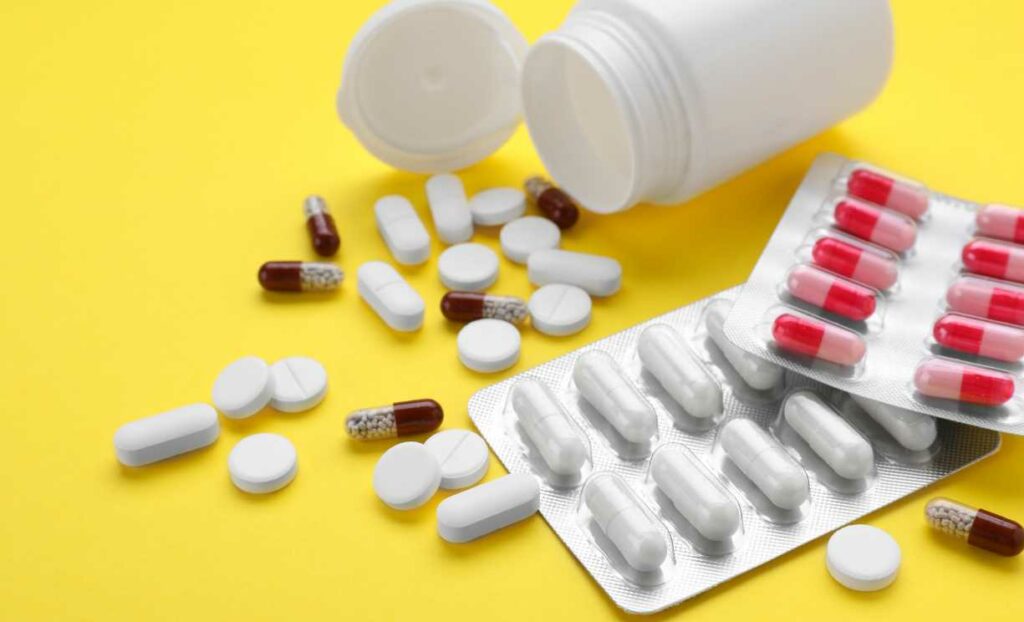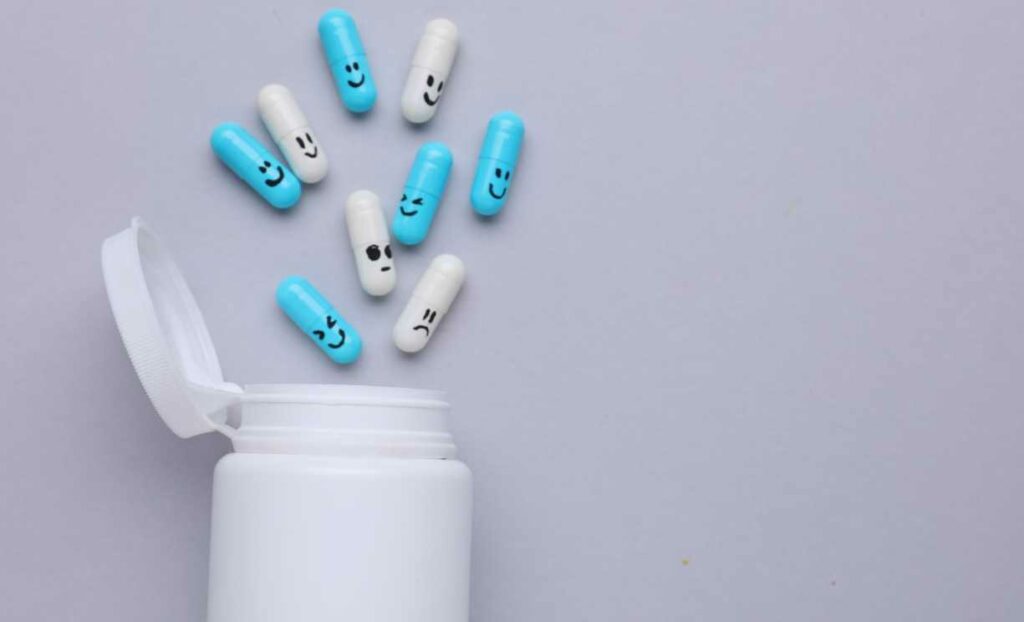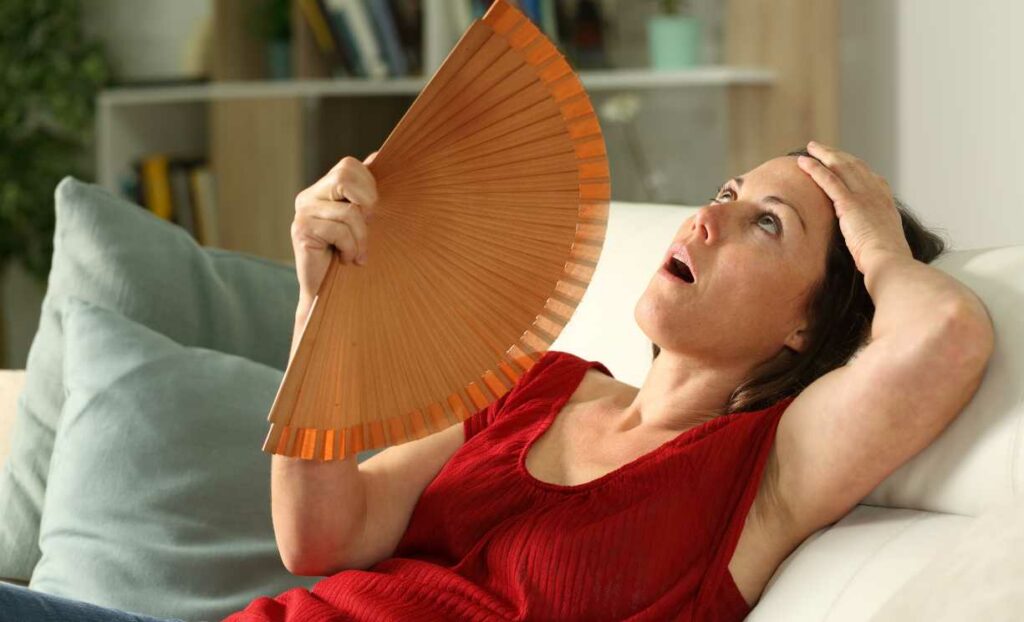Menopause, a natural transition in a woman’s life, often brings with it a unique set of challenges, including hot flashes and depression. The intersection of these symptoms can be particularly challenging, impacting both physical and emotional well-being. In this comprehensive guide, we’ll explore medications for hot flashes and depression during the menopausal journey.
Contents
Can Menopause Cause Hot Flashes And Depression?
Menopause can cause both hot flashes and depression, and these symptoms often go hand in hand during this transitional phase in a woman’s life.
Hot flashes are a hallmark symptom of menopause. They result from hormonal fluctuations, particularly a decrease in estrogen levels. Hot flashes are characterized by a sudden feeling of warmth, flushing, and sometimes sweating, and they can vary in intensity and duration.
Menopause can also be associated with mood changes and an increased risk of depression. The hormonal shifts, particularly the decline in estrogen, can influence neurotransmitters in the brain that are linked to mood regulation. Additionally, factors such as sleep disturbances, changes in body image, and the emotional impact of transitioning into a new life stage can contribute to feelings of sadness or depression.
There is a bidirectional relationship between hot flashes and depression. Experiencing persistent hot flashes can be emotionally distressing and disruptive to daily life, contributing to feelings of frustration, irritability, or mood swings. On the other hand, women who are already predisposed to depression may find that the physical discomfort and hormonal changes associated with hot flashes exacerbate their depressive symptoms.
Medications For Hot Flashes
Hot flashes, characterized by sudden waves of intense heat, flushing, and sweating, are a common and often disruptive symptom, especially during menopause. Fortunately, several medications offer relief from these uncomfortable episodes. Here’s a guide to medications commonly prescribed to manage hot flashes:
- Selective Serotonin Reuptake Inhibitors (SSRIs) and Serotonin-Norepinephrine Reuptake Inhibitors (SNRIs): Antidepressants like paroxetine, venlafaxine, and fluoxetine are prescribed for hot flashes. Beyond addressing depression, these medications have shown efficacy in reducing the frequency and intensity of hot flashes, making them suitable for women who cannot use hormonal therapies.
- Gabapentin and Pregabalin: Originally developed for seizures, these medications have proven effective in reducing hot flashes. Non-hormonal options provide relief, particularly for those who cannot or prefer not to use hormonal treatments.
- Clonidine: Originally used to treat high blood pressure, clonidine is sometimes prescribed for hot flashes. May help reduce the frequency of hot flashes by affecting the blood vessels and nerve impulses. However, its use is limited by potential side effects.
- Brisdelle (Paroxetine): Brisdelle is a non-hormonal medication specifically approved for treating moderate to severe hot flashes associated with menopause. Offers relief similar to SSRIs without affecting mood, making it a dedicated option for hot flash management.
- Before starting any medication, it’s crucial to consult with a healthcare provider. Individual health factors, potential side effects, and personal preferences will influence the choice of medication. Regular follow-ups ensure the effectiveness of the chosen treatment plan, allowing adjustments as needed for optimal relief from hot flashes.
Medications For Depression
Menopause, a phase marked by hormonal changes, can sometimes bring about symptoms of depression. Addressing depressive symptoms during this transitional period is essential for maintaining overall well-being. Here’s a guide to medications commonly prescribed to manage depression during menopause:
- Monoamine Oxidase Inhibitors (MAOIs): Monoamine Oxidase Inhibitors, represented by Phenelzine and Tranylcypromine, increase serotonin, norepinephrine, and dopamine levels by inhibiting the action of monoamine oxidase. While effective, their use is limited due to dietary restrictions and potential interactions with other medications. MAOIs are typically considered when other antidepressants are not effective or well-tolerated.
- Serotonin-Norepinephrine Reuptake Inhibitors (SNRIs): Serotonin-Norepinephrine Reuptake Inhibitors, such as Venlafaxine and Duloxetine are another class of antidepressants. They elevate both serotonin and norepinephrine levels, impacting neurotransmitters associated with mood.
- Tricyclic Antidepressants (TCAs): In some cases, Tricyclic Antidepressants like Nortriptyline may be considered for managing depression during menopause. These medications work by increasing levels of serotonin and norepinephrine. However, their use may be limited due to potential side effects.
- Atypical Antidepressants: Atypical Antidepressants, such as Bupropion and Mirtazapine, provide alternative options. Bupropion, for example, increases dopamine and/or norepinephrine levels, potentially offering relief from depressive symptoms. These medications may be chosen based on individual needs and tolerances.
- Ketamine and Esketamine: Ketamine and its derivative Esketamine represent a newer class of antidepressants. These medications act as NMDA receptor antagonists, impacting glutamate signaling. Known for their rapid-acting properties, they are particularly considered for treatment-resistant depression when other treatments have not been successful.
- Psychotherapy and Counseling: While not medications, psychotherapy and counseling play a crucial role in managing depression during menopause. Cognitive-behavioral therapy (CBT) and other therapeutic approaches provide valuable tools for coping with emotional challenges and addressing underlying issues contributing to depression.
Combination Therapies
Combination therapies for managing hot flashes and depression during menopause involve a multi-faceted approach to address these interconnected symptoms. Typically, this may include a combination of medications and lifestyle adjustments. For hot flashes, hormone replacement therapy (HRT) or non-hormonal medications such as SSRIs or SNRIs may be prescribed. These medications aim to alleviate the frequency and intensity of hot flashes. Simultaneously, for depression during menopause, antidepressant medications like SSRIs, SNRIs, or other suitable options may be recommended to address mood-related symptoms.
In addition to medications, lifestyle changes play a crucial role in combination therapies. Regular exercise, a balanced diet, and stress management techniques can contribute to overall well-being and help alleviate both hot flashes and depressive symptoms. Your healthcare provider may also integrate psychotherapy or counseling into the treatment plan to provide emotional support and coping strategies.
Managing Hot Flashes And Depression During Menopause
Managing hot flashes and depression during menopause through lifestyle changes can be an effective and holistic approach, complementing medical interventions. Here are lifestyle modifications that can contribute to alleviating these symptoms:
- Healthy Diet: Adopting a balanced and nutritious diet can positively impact both hot flashes and depressive symptoms. Foods rich in omega-3 fatty acids, vitamins, and minerals contribute to overall well-being.
- Stress Management: Practicing stress-reduction techniques, such as mindfulness, meditation, or yoga, can help manage both hot flashes and depression. Stress reduction is crucial as stress can exacerbate menopausal symptoms.
- Adequate Sleep: Establishing good sleep hygiene promotes better overall health. Ensuring a comfortable sleep environment, maintaining a consistent sleep schedule, and addressing sleep disturbances contribute to improved mood and reduced hot flashes.
- Limiting Caffeine and Alcohol: Both caffeine and alcohol can trigger or worsen hot flashes and disrupt sleep. Limiting their intake, especially in the hours leading up to bedtime, can contribute to symptom management.
- Hydration: Staying well-hydrated is essential, especially during hot flashes. Dehydration can exacerbate symptoms, so ensuring an adequate intake of water throughout the day is important.
- Social Support: Building a strong support system can help combat feelings of isolation and depression. Connecting with friends, family, or support groups provides emotional support and a sense of community.
- Cognitive-Behavioral Therapy (CBT): CBT is a therapeutic approach that can be effective in managing depressive symptoms. It helps individuals identify and change negative thought patterns and behaviors, providing coping strategies for emotional well-being.
- Cooling Techniques: For hot flashes, adopting cooling techniques like using fans, dressing in layers, and keeping the environment cool can help alleviate the discomfort associated with temperature fluctuations.
- Mind-Body Practices: Integrating mind-body practices such as tai chi or biofeedback can contribute to overall relaxation and stress reduction, positively impacting both hot flashes and mood.
Conclusion
In conclusion, navigating the challenges of hot flashes and depression during menopause requires a multifaceted approach that often includes medications as a key component. Whether opting for hormone replacement therapy (HRT) to address hormonal imbalances or choosing antidepressants to alleviate mood-related symptoms, the decision to incorporate medication should be guided by careful consideration and consultation with healthcare professionals.
While medications play a crucial role in managing these symptoms, the journey toward relief is not limited to pharmaceutical interventions alone. Lifestyle changes contribute significantly to overall well-being. Combining these lifestyle modifications with medications creates a comprehensive strategy that addresses the physical, emotional, and psychological aspects of menopausal symptoms.
If you are facing menopause related issues, menopause treatment at HerMantra can help. Book your free trial online menopause treatment session now.





